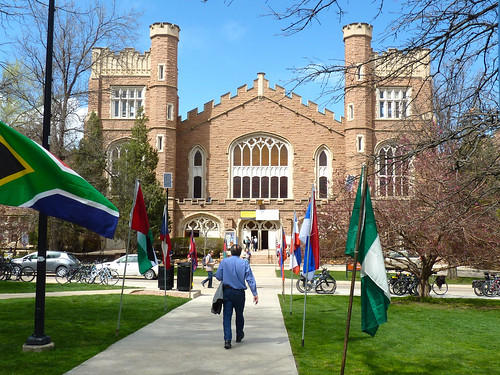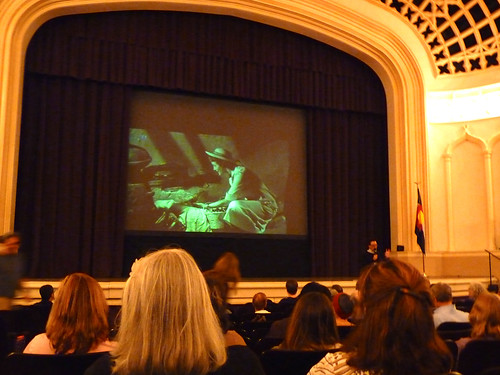This week I’m at the 67th Conference on World Affairs in Boulder, Colorado. It’s an absolute luxury to attend a conference without worrying about moderating panels or sharing my own work, and I’ve been eating this up. This year’s theme is Everything Conceivable.
The “Satire” panel on Monday afternoon featured author G. Willow Wilson, whose Arab Spring fantasy novel Alif the Unseen is a favorite of mine. (Wilson also pens the comic Ms Marvel, which was just nominated for a Hugo award.) She had a lot to say about millennial audiences and their ability to grasp the concept of intersectionality as it relates to humor. We all live at the intersection of multiple identities and allegiances, she reminded us, with nobody being just one thing. Her fellow panelist Robert A. George agreed, describing himself as a “West African gay Republican Catholic” and noting that any humor dependent on a presumed monolithic audience is not going to work, not for him. The panel also discussed the importance of using humor to punch up, speaking truth to power. If it’s punching down, it’s not satire.
Later on Monday I attended Cinema Interruptus, headed by David Bender. Originally the brainchild of Roger Ebert, Cinema Interruptus allows the audience to watch the entire film uninterrupted on the first night, then reviews the same film over the rest of the week with opportunities for anyone in the audience to stop the reel when they wish to discuss a point or ask a question. This year’s offering was Elia Kazan’s powerful 1957 film A Face in the Crowd. It’s a surprisingly timeless narrative, in which a folksy drifter becomes a media sensation, gets drunk on his power to manipulate the crowd, descends into charismatic demagoguery, and subsequently goes full Charlie Sheen, much to the distress of the woman who thinks she loves him.
Wednesday afternoon I attended a plenary session by Valerie Plame Wilson, whose topic was “Do You Wish You Didn’t Know: Snowden, Privacy & Democracy.” As America’s most famous “outed” CIA operative, Ms. Wilson definitely has her share of expertise regarding both national security and the right to privacy. She was not at all interested in discussing whether Edward Snowden, in leaking secret files from the NSA, was acting as a virtuous whistle blower or a despicable traitor. Rather, she invited us to reflect on what we now know and to consider the price we may pay as a society if we continue to allow government surveillance to expand exponentially, lacking in checks and balances. “Clearly, oversight of these programs is broken,” she said.
Here are a few more quotations from her talk: “There has been very little push-back against the encroachment of surveillance. People were fascinated by the drama of Snowden’s story. But we didn’t think about what his revelations actually meant.” She contrasted the role of government surveillance with the data we surrender to corporations like Amazon, saying, “We’ve willingly given up so much of our privacy. It’s a completely different construct of what privacy is. But the mass accumulation of personal information is subject to abuse.” Most Americans don’t mind when Amazon spies on their shopping habits, so they think that government snooping is no different. “But the difference is that corporations like Amazon don’t have the power to take away our freedom.”
I don’t have a great segue connecting us to the next topic, but the words “corporation” and “shopping” will do. There were a number of panels on consumer culture, including “Romancing the Purse: Product Design and Consumer Culture” and “Market Disrupters: Makers, Shakers, and Sharers.” Jules Pieri, founder of the curated shopping site The Grommet, rhapsodized in both panels about the brave new world of maker culture, which enables people to shop based on their values. Instead of boycotts, one can have “buycotts,” she said, adding that consumers today are increasingly intentional, wanting to know the stories behind the products that they buy, wanting to make a difference with their wallets through “Citizen Commerce.”
(I tend to believe Pieri’s citizen shoppers are mostly affluent older people and educated millennials, not the population as a whole, but I will acknowledge that I’m in the dark about what goes on in the typical shopping mall.)
While Pieri celebrated smart, value-driven consumption and new sharing-based economies, futurist Jamais Cascio asked us to consider what happens to the precariat when habits of consumption are in flux, the precariat being members of the working class who struggle with job insecurity and unpredictable economic conditions. What’s happening to their precarious jobs when consumer habits change? Another question worth asking: what’s happening to the environment?
After attending these panels on consumerism, I thought a lot about my role as a consumer and as a maker. Visiting Jules Pieri’s site at The Grommet, I found an elegantly curated collection of maker-produced items, most of them products that people don’t really need. I’m not pointing fingers at anyone here, since I certainly buy things I don’t need, the usual suspects being books and digital media, knitting yarn, antique and handmade jewelry, red wine, Belgian chocolate, and vintage clothes. I’m no saint, and hardly the minimalist I would like to be. So I have to continue asking myself, Are my choices helping the planet? Are they helping workers in need?



